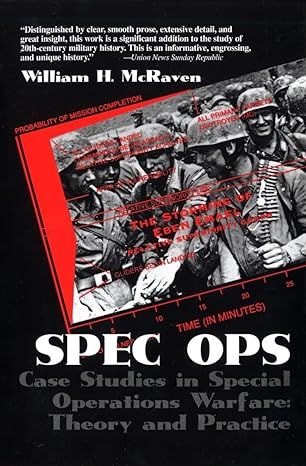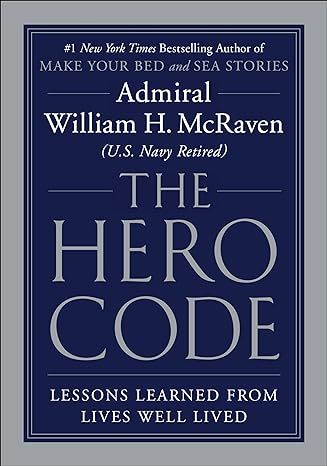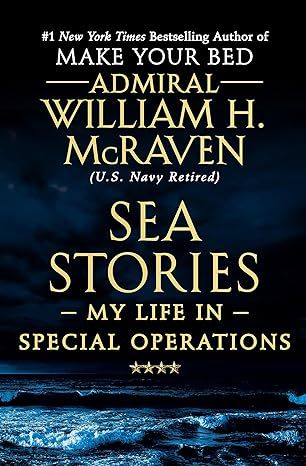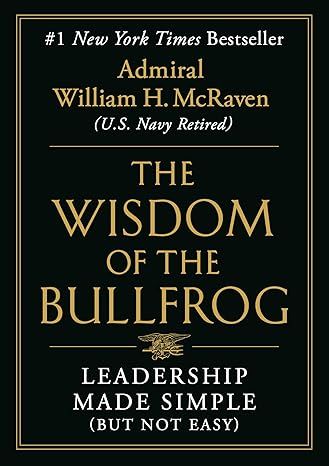Spec Ops: Case Studies in Special Operations Warfare: Theory and Practice
4.6 out of 5
714 global ratings
Vice Adm. William H. McRaven helped to devise the strategy for how to bring down Osama bin Laden, and commanded the courageous U.S. military unit that carried it out on May 1, 2011, ending one of the greatest manhunts in history. In Spec Ops, a well-organized and deeply researched study, McRaven analyzes eight classic special operations. Six are from WWII: the German commando raid on the Belgian fort Eben Emael (1940); the Italian torpedo attack on the Alexandria harbor (1941); the British commando raid on Nazaire, France (1942); the German glider rescue of Benito Mussolini (1943); the British midget-submarine attack on the Tirpitz (1943); and the U.S. Ranger rescue mission at the Cabanatuan POW camp in the Philippines (1945). The two post-WWII examples are the U.S. Army raid on the Son Tay POW camp in North Vietnam (1970) and the Israeli rescue of the skyjacked hostages in Entebbe, Uganda (1976). McRaven—who commands a U.S. Navy SEAL team—pinpoints six essential principles of “spec ops” success: simplicity, security, repetition, surprise, speed and purpose. For each of the case studies, he provides political and military context, a meticulous reconstruction of the mission itself and an analysis of the operation in relation to his six principles. McRaven deems the Son Tay raid “the best modern example of a successful spec op [which] should be considered textbook material for future missions.” His own book is an instructive textbook that will be closely studied by students of the military arts. Maps, photos.
432 pages,
Kindle
Hardcover
Paperback
Spiral-bound
First published May 31, 1996
ISBN 9780891416005
About the authors
William H. McRaven
Admiral William H. McRaven (U.S. Navy Retired) is the #1 New York Times bestselling author of Make Your Bed and the New York Times bestseller Sea Stories: My Life in Special Operations. In his thirty-seven years as a Navy SEAL, he commanded at every level. As a Four-Star Admiral, his final assignment was as Commander of all U.S. Special Operations Forces. After retiring from the Navy, he served as the Chancellor of the University of Texas System from 2015 to 2018. He now lives in Austin, Texas with his wife, Georgeann.
Read more
Reviews
GB
5
good book
Reviewed in the United States on February 10, 2023
Verified Purchase
liked it
JJ Waldron
5
Fantastic read
Reviewed in the United States on December 7, 2018
Verified Purchase
“Spec Ops” is a great book for any military personnel. It gives an in depth look at special operations, but much of the book is applicable to any military operation. The case studies are entertaining and give a different approach than any other book I have read. Easy to read and highly addicting, I highly recommend it.
Muscovite
5
insightful outline of specops
Reviewed in the United States on May 7, 2015
Verified Purchase
This is in a great book. The author is well versed and personally experienced in special operations. I bought a copy several years ago through a book club. I got it for 1 cent :).... I read it twice and gave that copy to my son. I wanted to read it again and found that it is no longer in print. I saw some advertised pricings that were unbelievable. I found this copy for a reasonable price and I am happy to have it. The book is a great read for specops enthusiasts or even experienced operators. This copy does have some wear and some writing in it. However, the wear is reasonable and the writing is neat and readable, and I get the impression that the previous owner was using this book as a text for socio-political studies, so I am not to awfully disappointed with the noteage because It adds a little different character to this copy. In regard to context, the author draws the reader into the scene, details the event from concept to execution, and offers insight not found in a novel. I would recommend this book anyone interested in history but mostly for those seeking to understand the outline of specops thinking and planning.
Read more
D. Deaton
5
Excellent Book With a Direct Application to SWAT Operations
Reviewed in the United States on July 3, 2011
Verified Purchase
Those who are looking for gripping war stories or a Walter Mitty reading exerience should look elsewhere. This is a serious work meant for a professional audience.
The author does an excellent job of "trimming the fat" from Strategy and Tactics as they are normally applied to larger units and instead focuses on the "Six Principles of Special Operations." These are: Simplicity, Security, Repetition, Surprise, Speed, and Purpose. While each case study in this book focuses on military actions, the lessons and examples in this book are directly applicable to SWAT operations. The analytical processes and tactical procedures discussed in this work will help police officers triumph over dangerous criminals and save innocent lives.
The concepts in this book dovetail perfectly with modern SWAT doctrine as taught by the NTOA and other competent, professional SWAT organizations. It is a wonderful companion piece to the works of Sid Heal and John Kolman; especially if you are a SWAT Commander. If you have to plan, command, or conduct a hostage rescue operation, you will wish that you had read this book.
Read more
2 people found this helpful

Dr. Nancy L. Nicholson
5
Important reading for tracking the evolution of war making.
Reviewed in the United States on January 24, 2013
Verified Purchase
I give this five stars for its clarity, mutually consistent concepts and relevance, but would give it many more.
Admiral McRaven, by published accounts, was a major player in planning the raid that Seal Team Six made on the Usama Bin Laden compound. Other reviewers have gone into more detail than I will, but four items from its conceptual toolkit are useful to my discussion, focused on the mutable character of war making. I will use two accounts about the Bin Laden raid to illustrate some points related to the Admiral's book.
In my lifetime, war making has changed from the "conventional" army operations of WW2 to the Cold War of regional military efforts, to this era of "terrorist" war making. I refuse to name this use of collateral damage by "special human/technical weapons" as a "war on terror." It is dependent on media coverage of carnage wrought on budgets generally smaller than for conventional wars. War is made on a specific adversary, not on a method. SPEC OPS preceded its practical importance by more than a decade, a tribute to a brilliant analyst.
- McRaven's theory of special operations proposes "...a successful special operations defies conventional wisdom by using a small force to defeat a much larger or well-entrenched opponent."
- The smaller force relies on precision, stealth and speed to achieve "strategic advantage of relative superiority."
- McRaven defines special operations as "A special operation is conducted by forces specially trained, equipped, and supported for a specific target whose destruction, elimination, or rescue (in the case of hostages) is a political or military imperative."
- The ruling idea is from General Carl von Clauswitz' "frictions of war" (chance, uncertainty and will of the enemy). This "friction" is an emergent property of the interactions of nonlinear outcomes from a number of sources in the combat arena. It would be helpful here to get and to read (if not already at hand) Clauswitz' "On War" to be familiar with his trinitarian analysis.
There are many books available on the Bin Laden raid. Each has a somewhat different account, according to published reviews. I have two of them: Mark Owen's "No Easy Day" and "SEAL Target Geronimo: The Inside Story of the Mission to Kill Osama bin Laden." Of the two, "SEAL Target" is the more credible account for me, as its described sequence of the raid near Abbottabad does not damage the "strategic advantage/relative superiority" of McRaven's planning by losing its stealth at the beginning with a helicopter crash. I commend you to McRaven's Figure 1-1 Sample Relative Superiority Graph. Its time line goes from "point of vulnerability" to six hours, with a radical change of risk at about 2.5 hours. As the remainder of the book explains, this is a complex type of multilevel systems undertaking based on competency with an amazing array of weapons, accurate intelligence (human and technical), courage and character (not necessarily in that order). Those who are members of elite military teams are aware of Murphy's Law. Or, as Clauswitz points out, "The greater the magnitude of any event, the wider the range of forces and circumstances that affect it." It is imperative to have creative backups to Plan A.
Bin Laden raid books are easily available for comparison of accounts of an event where some critical details will necessarily remain hidden. As Macchiavelli pointed out, "When little is known, much is suspected." Readers should examine various versions of the raid on Bin Laden in the light of learning about the budgeting and planning expenses of this species of "black operations" war. I am reminded of variations in some important official accounts in my lifetime, starting with the Eisenhower administration's handling of the Francis Gary Powers U2 incident, the Warren Commission Report on the assassination of President Kennedy, the Reagan Administration raid on Grenada* and now the current administration's accounts of the Bin Laden raid. The movie "Zero Dark Thirty" is not a subject of this review.
Stories groups craft to explain their actions may tell more about them than if they were transparent about their assertions. Mc Raven's book is a useful place to start to understand the "learning curve" that underlies a history of wars. This review would get even longer if I suggested more history of war or art/science of war books. But "SEAL Target Geronimo" recommends "The Book of Five Rings" or the Way of the Warrior by Miyamoto Musashi (translated by Jo Han-sun). "Leaders must exercise it, soldiers must know it. No one living really knows all there is to know about strategy."
*This raid was a textbook case of "Cold War geopolitical chess." Get out a map of the Caribbean and technical specs of MiG 23 aircraft in terms of flight radius with bases on eastern Cuba, El Salvador and finally, Grenada. With the third southern piece of the puzzle under Soviet control, economic and strategic shipping in the Caribbean and Panama Canal Zone could have been interdicted at will.
Read more
8 people found this helpful
Jack Silkstone
5
Definitive academic reference for Spec Ops theory
Reviewed in the United States on August 7, 2011
Verified Purchase
Vice Admiral William McRaven is a bit of a legend in the Special Ops world. The current head of Joint Special Operations Command (JSOC) has been leading, planning and directing SEAL Team Ops since Jesus was playing fullback for Nazareth.
Word on the street is he played a pretty key role in the death of Bin Laden. He may not have pulled the trigger but it was his command that planned and executed the Op. Panetta, former head of the CIA, is said to have handed Operation Neptune's Spear over to McRaven and his team of Counter Terrorism specialists.
Most of those within the Special Operations community would recognize his name from the seminal book, Spec Ops: Case Studies in Special Operations Warfare: Theory and Practice, so I thought I'd have another look over it and do up a review.
Spec Ops was published in 1995, when McRaven was commanding a SEAL Team. It's basically a historical look at 'Direct Action' missions from 1940 through to 1976. Direct Action (DA) is a term used in the Special Ops world to describe a short offensive action against a target (person or building), usually behind enemy lines. DAs are known for their precision and violence.
McRaven's book is well researched and referenced, and his subject matter expertise is evident throughout. In fact it has become a bit of a 'bible' for Special Operations theory. The Admiral convincingly argues his theory of 'Relative Superiority' and his six principles of Special Operations. Worth the read just to pull out these little gems.
So who should read it? Well, the book's a must for any serious student of military history or any Special Ops buff. It's the definitive academic reference on Special Operations theory for Direct Action on heavily fortified targets. The lessons and theory drawn out of it remain relevant for current day operations, as evidenced in the success of Neptune's Spear.
However, it does have some limitations. This book isn't an up-to-date classified tactics and procedures manual. Special Ops have advanced leaps and bounds since the 70's, particularly in the fields of intelligence, air support, cyber warfare and insertion techniques. In short, Spec Ops is a well-researched history on DAs. If you're after something more entertaining with a bit more bang, grab one of my PRIMAL books.
Read more
3 people found this helpful
Ms. Nuschler
5
Must read about the philosophy behind Special Operations.
Reviewed in the United States on July 22, 2014
Verified Purchase
Special Operations-"Spec Ops" is what JSOC is. Joint Services Operations Command. In today's all volunteer military JSOC is the best of our forces. 50 year old US Army helicopter pilots, the Navy's SEALs (Sea, Air, Land), UDT (Underwater Demolition.) But these aren't actors in movies...these people (and their service dogs) infiltrate, exfiltrate, and perform covert operations. The ten year hunt for Osama Bin Laden was started by our intelligence agencies and culminated with Spec Ops at Abbotabad, Pakistan.
This book was written WAY before the assassination of Bin Laden. Today's director of Spec Ops, Vice Admiral William McRaven was a Navy SEAL who helped with the formation of this team. It's literally a textbook explaining how Spec Ops works. It takes 6 epic military exfiltrations and explains how they all worked with philosophy of Spec Ops. The Raid at Entebbe...the release of Mussolini from his high altitude ski resort prison---all operations we have seen in films or read about in history books. McRaven takes them apart and showed why they worked...and where they didn't work.
Brilliant text showing military maneuvers at its best. Whether it's Bin Laden's assassination to freeing a US Captain from Somali Pirates we still see McRaven's tactics at work. The planning for every conceivable problem, the execution...and what is NOT seen in a Hollywood movie...the unforeseen mistakes, and human error. Today's Israeli President Bebé Netanyahu's brother, colonel Netanyahu is the driving force behind the Raid at Entebbe Airport. He died in that raid. This is the real world...not fantasy.
Spec Ops is an absolute read for anyone interested in military history...or for anyone who wants to know the inside story behind today's headlines.
Read more
2 people found this helpful
William Terdoslavich
4
Required reading that goes beyond the action.
Reviewed in the United States on June 6, 2011
Verified Purchase
"Spec Ops--Case Studies in Special Operations Warfare: Theory and Practice" by William H. McRaven.
Quite often, books about special forces are heavily based on anecdote and action. They still explain and illuminate the tasks and missions of special forces, if the reader pays attention to the details and connects all the dots. William R. McRaven eschews that approach and makes the case for special forces in his book "Spec Ops", a book he penned while commander of Seal Team 3 in the 1990s.
By applying analysis to eight case studies, McRaven explains how special forces are used to achieve outsized results relative to their size. It always comes down to the smaller force beating out the larger one, but it takes speed, simplicity and "relative superiority"--the ability to maintain the initiative until mission completion.
McRaven relies on two conceptual graphics to explain how he takes the measure of each mission.
First, every special forces mission looks like an inverted pyramid resting on an narrow apex, top-heavy and easy to topple. At the bottom is planning, which requires simplicity. Preparation occupies the middle tier, relying on security (to keep the mission secret) and repetition (practice makes perfect). At the top are surprise, speed and purpose. The "friction" of war presses against the top-heavy side of the pyramid, as things going wrong threaten to upset the raid, which is reinforced by "moral factors"--the determination of the raiders to complete the mission.
Second, he also graphs the mission profile, ascending from a point of vulnerability (where detection by the enemy can kill the mission), up past a line of "relative superiority," where the raiders seize and hold the initiative. This line climbs sharply to the point where relative superiority can be achieved and maintained until mission completion. The longer the mission takes to reach relative superiority, McRaven marks as the "area of vulnerability". The larger it is, the greater the chance for mission failure.
McRaven applies his metric to take the measure of eight different missions: the German raid on Eben Emael, the Italian attack on the battleships Valiant and Queen Elizabeth, the british commando raid on St. Nazaire, the British midget sub attack on the battleship Tirpitz, the US Ranger raid on Cabanatuan, the US raid on Son Tay, and the Israeli raid on Entebbe.
In each instance, the raiding force rapidly gathered deep pre-raid intelligence on the target, spotted the weakpoints, then designed a plan to exploit those enemy weaknesses. Plans depended on swift and certain attack, and speed is of the essence. Raiders can only take what weapons they can carry, so if they do encounter heavier forces, their ability to fight with advantage will be negated.
The book is especially significant today, as Vice-Admiral McRaven now is in charge of Special Operations Command, whose Navy SEALs just recently took out Osama bin Laden. McRaven penned his analysis back in the 1990s, when he commanded SEAL Team 3. Yet the factors and "lessons learned" are clearly seen in the broad profile bin Laden raid: a simple plan with a simple goal, accomplished in five minutes and completed in less than an hour.
Read more
6 people found this helpful
Kindle Customer
4
For Those Who Don't Consider It Mandatory Reading:
Reviewed in the United States on September 8, 2016
Verified Purchase
This study is what it is, and one can hardly find fault with its place in history. If you're one of the people who knows you ought to read it, you don't need this review. For everyone else, just so you understand:
- Ignore the publishing date. This is McRaven's 1993 NPS thesis (as an O-5 Commander), so it's quite dated even in his own career. In fact as the description notes, its cases are from 1940-45, 1970, and 1976. (Yes, he does not do Operation Eagle Claw.)
- I'll highlight that again: this is a Naval Postgraduate School thesis. It's written like one, so I hope you like that.
- McRaven is a SEAL, and "Spec Ops" to him means direct action. This book includes nothing about unconventional warfare or counterinsurgency, etc, and in fact his definition excludes these.
- If you're not sure if the book is for you, know that since this started as an NPS thesis, it's published for free by DTIC. I was happy to get the book for the referenceable format, but it may not be worth it to you.
Read more
41 people found this helpful
Jim
4
A BIG PLEASANT SURPRISE
Reviewed in the United States on February 23, 2018
Verified Purchase
I don't normally read military history. But after reading is book Make Your Bed, I wanted to learn more about a man that could command SEALs and run a university. The fact that his theory of special operation was derived inductively from 8 case studies most of which I had never heard of made the propects for interesting reading more likely. I found the style was concise and readable. I found myself caught up in the planning and layout of the operations, opening Google Maps constantly so I could imagine the terrain and envision myself alongside the forces engaged in these amazing operations. The experience was very satisfying. And the analysis McRaven provides for each case is helpful, seems right, and reinforcing each time it was repeated for each case. I came away awed by the intelligence and bravery of the men who executed these operations. I learned a lot about the history of the conflicts and about the cultures involved. Even if you don't think you'd like reading about war, I'd encourage you to try it. It is a long book and I thought I'd bog down....NOT AT ALL! War is not pretty, but these operations and the thought invested make it obvious that it is indeed not just a science but an art.
Read more
10 people found this helpful
Top William H. McRaven titles
Best Sellers

The Tuscan Child
4.2
-
100,022
$8.39

The Thursday Murder Club: A Novel (A Thursday Murder Club Mystery)
4.3
-
155,575
$6.33

Sapiens: A Brief History of Humankind
4.6
-
140,302
$13.49

The Butterfly Garden (The Collector, 1)
4.3
-
88,556
$9.59

Things We Hide from the Light (Knockemout Series, 2)
4.4
-
94,890
$11.66

The Last Thing He Told Me: A Novel
4.3
-
154,085
$2.99

The Perfect Marriage: A Completely Gripping Psychological Suspense
4.3
-
143,196
$9.47

The Coworker
4.1
-
80,003
$13.48

First Lie Wins: A Novel (Random House Large Print)
4.3
-
54,062
$14.99

Mile High (Windy City Series Book 1)
4.4
-
59,745
$16.19

Layla
4.2
-
107,613
$8.99

The Locked Door
4.4
-
94,673
$8.53





